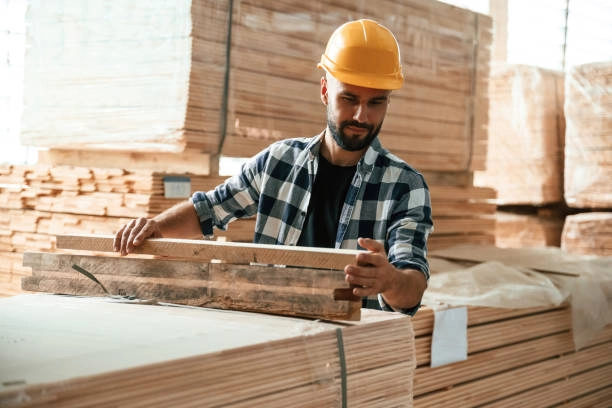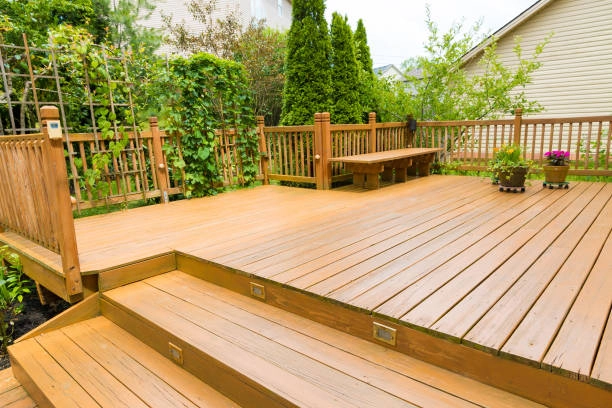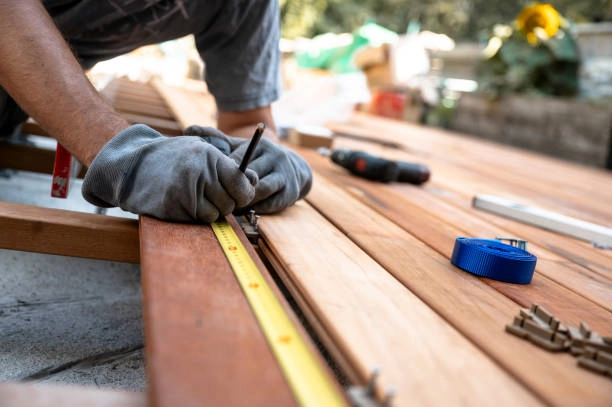When you decide to build a deck, partnering with a professional decking contractor is the key to achieving the outdoor space of your dreams. Whether you want a simple wooden deck or a modern composite deck, a skilled contractor will guide you through the process, from design to completion. But what exactly should you expect when working with a contractor? In this guide, we’ll walk you through the essential stages of a decking project, giving you insights into the process and what to anticipate when you hire a contractor.

Step 1: Initial Consultation and Design Planning
The first step when working with a decking contractor is the initial consultation. This meeting is crucial for discussing your vision and determining the scope of the project. Your contractor will ask questions to understand your needs, preferences, and budget.
Key Aspects of the Initial Consultation:
- Your Vision: Be prepared to explain how you plan to use the deck—whether for hosting gatherings, creating a quiet retreat, or enhancing your home’s resale value.
- Budget: Have a rough idea of your budget so that the contractor can recommend materials and designs within your price range.
- Materials: The contractor will discuss material options such as decking wood, composite decking, and plastic decking boards. Each material has its pros and cons, and your contractor will help you select the one that best suits your needs.
- Design: At this stage, you’ll begin planning the deck’s layout and features, such as built-in seating, planters, or lighting. The contractor may provide sketches or digital renderings to give you a visual sense of the design.
Step 2: Site Assessment and Permits
Once the design is settled, your decking contractor will conduct a site assessment. This step involves examining your property to ensure the chosen design fits within the available space, while also evaluating the terrain, drainage, and accessibility. The contractor will identify any potential challenges, such as uneven ground or landscaping features that need to be addressed.
Site Assessment Includes:
- Measuring the Space: Your contractor will take precise measurements of your yard to ensure the deck fits perfectly and complies with local building codes.
- Assessing Soil and Drainage: The contractor will check the soil quality and drainage in the area to prevent future issues with deck stability.
- Permits and Regulations: In many areas, building a deck requires a permit. Your contractor will handle the permit application process, ensuring the project meets all local regulations and zoning requirements.

Step 3: Budgeting and Timeline
Before any construction begins, your decking contractor will provide a detailed estimate and timeline for the project. This estimate covers labor, materials, and any additional costs, such as permits or design adjustments. A clear timeline from your contractor ensures you know what to expect at each stage and helps keep the project on track.
What to Expect in the Estimate:
- Labor and Materials: The cost of labor and the chosen materials (such as composite deck boards or decking wood) will be itemized in the estimate.
- Project Timeline: Your contractor will outline the expected start and completion dates. While weather and unforeseen challenges can affect the timeline, a reliable contractor will keep you informed of any changes.
- Warranty Information: Many contractors offer warranties on their work. Make sure to ask about this, as it provides peace of mind in case of issues down the road.
Step 4: Choosing the Right Materials
Your contractor will guide you through selecting the best materials for your deck based on your lifestyle, budget, and local climate. The most common decking materials include wood, composite decking, and plastic decking boards.
Decking Materials Overview:
- Decking Wood: Traditional wood options like cedar and redwood are popular for their natural beauty and durability. However, they require regular maintenance, including sealing and staining.
- Composite Decking: Composite deck boards are made from a blend of wood fibers and plastic. They offer a low-maintenance alternative to wood and are resistant to rot, insects, and weathering.
- Plastic Decking Boards: These boards are made from 100% synthetic materials, such as PVC or recycled plastic. They are lightweight, moisture-resistant, and ideal for wet climates.
Your contractor will help you weigh the pros and cons of each material, ensuring you choose the one that aligns with your preferences and the environment in which you live.
Step 5: Construction Phase
Once the design is finalized and materials are selected, the construction process begins. Your decking contractor will outline the stages of construction and explain what to expect during each phase. This ensures you are informed and prepared, with a clear understanding of how the project will progress from start to finish.
Stages of Deck Construction:
- Site Preparation: The contractor will clear and level the ground, marking the area where the deck will be built.
- Building the Frame: The frame serves as the foundation of the deck. It involves installing posts, beams, and joists to create a solid structure.
- Laying the Decking: The decking material (wood, composite, or plastic) is then installed over the frame. This stage also includes cutting the boards to fit the design and securing them with screws or hidden fasteners.
- Adding Railings and Stairs: If your deck design includes railings or stairs, these will be installed during the final stages of construction.
- Finishing Touches: This includes adding any custom features, such as built-in seating or lighting, as well as sealing the deck if wood is used.
Throughout the construction process, a professional decking contractor will ensure that the work site is kept clean and that there is minimal disruption to your daily life. Their attention to detail and organization helps keep the project running smoothly, allowing you to enjoy the building process without unnecessary stress.
Step 6: Final Inspection and Walkthrough
Once the deck is complete, your contractor will conduct a final inspection to ensure everything has been built according to the plan and meets all safety standards. They will also walk you through the finished deck, explaining any maintenance requirements and warranty details.
Final Walkthrough Includes:
- Inspecting the Structure: The contractor will check the stability of the deck, ensuring that all materials are securely fastened and that the deck meets building codes.
- Maintenance Tips: Your contractor will provide guidance on maintaining your deck, whether it’s staining and sealing for wood or cleaning composite decking.
- Warranty Information: If your contractor offers a warranty, they will review the coverage and explain how to file a claim if necessary.
Why Choose Bayside Home Improvement as Your Decking Contractor?
At Bayside Home Improvement, we understand that building a deck is an investment in your home and lifestyle. Our experienced and licensed team is committed to delivering high-quality workmanship and personalized service from start to finish. When you work with us, you can expect:
- Expert Craftsmanship: With over 10 years of experience, we ensure your deck is built to last using top-quality materials like composite decking, decking wood, or plastic decking boards.
- Clear Communication: We prioritize transparency, keeping you informed at every stage of the project.
- Customized Design: We work closely with you to design a deck that complements your home and meets your specific needs.
- Dependable Service: As fully licensed and insured contractors, we guarantee that your project will be completed safely, on time, and within budget.

In conclusion, working with a decking contractor ensures your vision for a beautiful and functional outdoor space comes to life smoothly. From the initial consultation and material selection to the final walkthrough, a skilled contractor will guide you through every step of the process. Whether you opt for decking wood, composite decking, or plastic decking boards, a professional contractor can help you choose the best materials for your project, ensuring quality construction that lasts for years.
By partnering with the right contractor, you’ll enjoy peace of mind knowing your deck will be built to your exact specifications and expectations. Contact us today to learn more.
Frequently Asked Questions
1. What are the benefits of using composite decking over decking wood?
Composite decking offers several advantages, such as lower maintenance requirements, longer durability, and resistance to rot and insects. Unlike decking wood, composite deck boards don’t need staining or sealing, making them a great option for homeowners seeking minimal upkeep while still achieving a wood-like appearance.
2. How do I decide between decking wood, composite deck boards, and plastic decking boards?
When choosing between decking wood, composite deck boards, or plastic decking boards, consider factors like your budget, desired look, maintenance level, and local climate. Decking wood offers a classic look but requires more upkeep, while composite and plastic options are durable, low-maintenance choices suited for harsher climates.
3. What should I look for when hiring a decking contractor?
When hiring a contractor, seek one with experience, proper licensing, and good customer reviews. Ask for a detailed estimate that includes material costs (whether you’re using composite decking, decking wood, or plastic decking boards), and request a clear timeline for project completion.
4. How long does a deck construction project typically take?
The timeline for building a deck depends on factors like deck size, materials, and weather conditions. On average, a decking project can take anywhere from one to three weeks, but your contractor should provide a more specific timeframe after assessing your project and site conditions.
5. Do plastic decking boards perform well in wet climates?
Yes, plastic decking boards are highly resistant to moisture, mold, and pests, making them an excellent choice for wet or coastal climates. They also require minimal maintenance compared to traditional wood decking, which can warp or rot when exposed to excessive moisture.
6. How does the cost of composite decking compare to decking wood?
Composite decking generally has a higher upfront cost compared to traditional wood. However, because composite deck boards require little maintenance and last longer, they are often more cost-effective over time. Decking wood may be cheaper initially but will require regular sealing, staining, and repairs over the years.
7. What should I expect during the final inspection of my new deck?
During the final inspection, your contractor will assess the overall structure, ensure it meets safety standards, and review any additional features like railings or stairs. You’ll also receive maintenance tips for your chosen material whether it’s decking wood, composite decking, or plastic decking boards so your deck remains in top condition for years to come.

